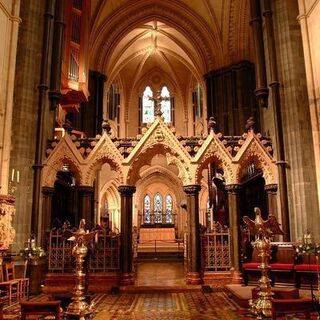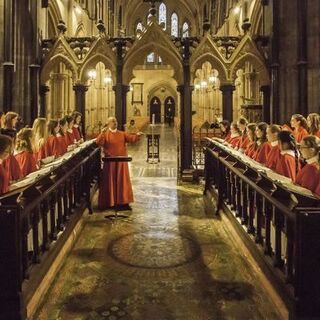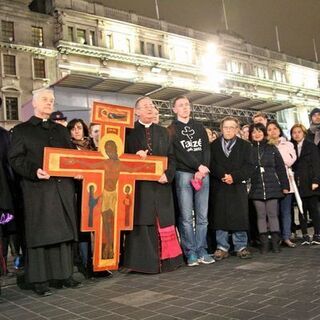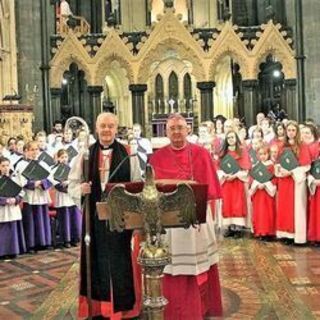Who we are
Welcome
From wherever you are I bid you a warm welcome to Christ Church Cathedral here in Dublin. People have been coming to this place to worship God for nearly one thousand years. While the building has journeyed through many changes over the centuries, the constancy of its witness has remained uninterrupted. The mission of any cathedral is to reflect through its beauty the transcendence of God. Every year thousands of visitors come through our doors to either visit a site of unique heritage or to celebrate with us in our liturgies. Irrespective of denomination, faith or non faith we welcome everyone as a pilgrim and it is our hope that as the pilgrim leaves, he or she will have been touched in some way by the love of God which shines in the beauty of this place. Maybe some day you will come as a pilgrim and visit this place which is the heart of Dublin.
The Very Revd Dermot Dunne, Dean of Christ Church Cathedral
From wherever you are I bid you a warm welcome to Christ Church Cathedral here in Dublin. People have been coming to this place to worship God for nearly one thousand years. While the building has journeyed through many changes over the centuries, the constancy of its witness has remained uninterrupted. The mission of any cathedral is to reflect through its beauty the transcendence of God. Every year thousands of visitors come through our doors to either visit a site of unique heritage or to celebrate with us in our liturgies. Irrespective of denomination, faith or non faith we welcome everyone as a pilgrim and it is our hope that as the pilgrim leaves, he or she will have been touched in some way by the love of God which shines in the beauty of this place. Maybe some day you will come as a pilgrim and visit this place which is the heart of Dublin.
The Very Revd Dermot Dunne, Dean of Christ Church Cathedral
Church Address
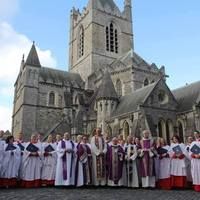
Christchurch Place
Wood Quay
Dublin,
County Dublin
Wood Quay
Ireland
Phone: (01) 677 8099
Download Christ Church Cathedral vCard with Service Times
Click here to contact the church
Church Pastor

The Very Revd Dermot Dunne
Dean
Christchurch Place
Wood Quay
Dublin,
County Dublin
Wood Quay
Ireland
Phone: (01) 677 8099
Download Dean The Very Revd Dermot Dunne vCard
Click here to contact The Very Revd Dermot Dunne
Denomination
Church of Ireland
Church of Ireland churches in Dublin, County Dublin
Church of Ireland churches in County Dublin
Church of Ireland churches in Ireland
Church of Ireland churches churches near me
All churches in Dublin, County Dublin
Affiliations
Church Website
Christ Church Cathedral on Social Media
Leadership
Leader Name:
The Very Revd Dermot Dunne
Leader Position:
Dean
Formal Title:
Leader Address:
Phone:
Fax:
Leader Email:
Click here to contact The Very Revd Dermot Dunne
Leader Bio:
The Very Revd Dermot Dunne on Social Media:
Other Church Leaders:
The Reverend Abigail Sines, The Dean’s Vicar
Leadership Photos
Add a Photo
Administration
Admin Name:
Ms. Susanne Reid
Admin Position:
Head of Tourism and Events
Admin Address:
Phone:
Fax:
Admin Email:
Click here to contact Ms. Susanne Reid
Mailing Address
Driving Directions
Travel/Direction Tips
Know how to get there? Share the knowledge with others!
Parking
Please share parking information and/or parking experience!
Christ Church Cathedral Service Times
Weekly Services – Spring 2017
Monday-Friday, 10.00 am: Morning Prayer
Monday-Saturday, 12.00 pm: Peace Prayers
Monday-Friday, 12.45 pm: Eucharist
Monday and Friday, 5.00 pm: Said Evening Prayer
Tuesday, 6.00 pm: Compline, sung by a consort of Cathedral Lay Vicars Choral (during term time)
Wednesday, 6.00 pm: Choral Evensong, sung by the Girl Choristers (during term time)
Thursday, 6.00 pm: Choral Evensong, sung by the Cathedral Choir (during term time)
Saturday, 6.00 pm: Compline, sung by a consort of Cathedral Lay Vicars Choral (during term time)
Sung service times may vary, especially out of cathedral choir terms. Please check the current music list for further details:
http://christchurchcathedral.ie/worship/current-music-list/
It's been more than 7 years since the last service times update. Please make sure to contact the church to confirm service times.
Please contact the church to confirm Service Times or SUBSCRIBE to updates below
Monday-Friday, 10.00 am: Morning Prayer
Monday-Saturday, 12.00 pm: Peace Prayers
Monday-Friday, 12.45 pm: Eucharist
Monday and Friday, 5.00 pm: Said Evening Prayer
Tuesday, 6.00 pm: Compline, sung by a consort of Cathedral Lay Vicars Choral (during term time)
Wednesday, 6.00 pm: Choral Evensong, sung by the Girl Choristers (during term time)
Thursday, 6.00 pm: Choral Evensong, sung by the Cathedral Choir (during term time)
Saturday, 6.00 pm: Compline, sung by a consort of Cathedral Lay Vicars Choral (during term time)
Sung service times may vary, especially out of cathedral choir terms. Please check the current music list for further details:
http://christchurchcathedral.ie/worship/current-music-list/
It's been more than 7 years since the last service times update. Please make sure to contact the church to confirm service times.
Please contact the church to confirm Service Times or SUBSCRIBE to updates below
Worship Languages
Dress Code
Sunday School / Children and Youth Activities
Under 12s:
Under 18s:
Local outreach & community activities
Other activities & ministries
Special Needs/Accessibility
Prayers and Hymns
Main Bible:
Hymns and Songs:
Other information
Average Adult Congregation:
Average Youth Congregation:
Additional Info:
Christ Church Cathedral Church Dublin Photos
Christ Church Cathedral History
The History of Christ Church Cathedral, Dublin
The earliest manuscript dates Christ Church Cathedral to its present location around 1030. Dúnán, the first bishop of Dublin and Sitriuc, Norse king of Dublin, founded the original Viking church, which was probably subject to the archbishop of Canterbury. By 1152 it was incorporated into the Irish church and within a decade the famous archbishop Laurence O’Toole had been appointed. This future patron saint of Dublin began a reform of the cathedral’s constitution along European lines and introduced the canons regular of Saint Augustine forming a cathedral priory, which was to survive until the Reformation following the liturgical use of Sarum (Salisbury) in England.
Laurence O’Toole acted directly in diplomatic efforts between the Dubliners and the Anglo-Normans including Strongbow (Richard de Clare) following the capture of the city in 1170. It was due largely to John Cumin, the first Anglo- Norman archbishop, that the Hiberno-Norse cathedral was replaced with the Romanesque and later Gothic cathedral, parts of which survive today. In 1395 King Richard II sat in state in the cathedral to receive homage from the kings of the four Irish provinces O’Neill of Ulster, McMurrough of Leinster, O’Brien of Munster and O’Connor of Connacht. In 1487 Lambert Simnel, pretender to the English throne in the reign of Henry VII was ‘crowned’ in Christ Church as Edward VI.
In the sixteenth century, reform again came from England when Henry VIII broke from Rome. He dissolved the Augustinian priory of the Holy Trinity and established a reformed foundation of secular canons. On 22 December 1541 Robert Castle (alias Paynswick), the last prior, became the first dean of Christ Church. In 1562, the nave roof vaulting collapsed and Strongbow’s tomb was smashed, the current tomb being a contemporary replacement from Drogheda. The cathedral was in ruins and emergency rebuilding took place immediately. This temporary solution lasted until the 1870s! Since the collapse of the roof, the north nave wall has leaned out by 46cm / 18 inches. Political changes over the years were reflected in the changes of administration of the cathedral and following the virtual collapse of the cathedral system during the Cromwellian period, Christ Church was given a new constitution in 1660 which, as modified by the Church of Ireland’s general synod since 1870, is still the basis of the rule governing the cathedral.
In 1689 King James attended Mass here and for a brief period, the rites of the pre-Reformation faith were restored. One year later, returning from the Battle of the Boyne on 6 July 1690, King William III gave thanks for his victory over King James II and presented a set of gold communion plate to the cathedral. During the 16th and 17th centuries, Christ Church’s crypt was used as a market, a meeting place for business, and at one stage even a pub as a letter of 1633 shows: the vaults from one end of the minster to the other are made into tippling houses for beer, wine and tobacco.
In 1742 the cathedral choir together with the choir of St Patrick’s cathedral sang at the world premiere of Handel’s Messiah in nearby Fishamble Street. The Church Temporalities Act of 1833 brought partial disendowment and impoverished what had been one of the wealthiest ecclesiastical corporations in Ireland. When Charles Lindsay, bishop of Kildare and dean of Christ Church (a position which had been held together since the 17th century) died in 1846, the dean of St Patrick’s cathedral also became the dean of Christ Church. Not until 1884 did Christ Church have its own dean once more.
The cathedral as it exists today is heavily Victorianised due to the extensive restorations and renovations carried out by the architect George Edmund Street (between 1871 and 1878) at the expense of a Dublin whiskey distiller, Henry Roe, who gave £230,000 (€35m today!) to save the cathedral. The disestablishment of the Church of Ireland in 1871 saw further constitutional change and financial disendowment at the cathedral. With members of the laity now responsible for the building’s maintenance it became essential to provide for lay participation in its governance. A cathedral board of laymen (as was the case then) and clergy was formed in addition to the solely clerical chapter.
A two-year restoration of the cathedral roof and stonework was undertaken in 1982. Kenneth Jones of Bray installed a new organ in 1984. Further work since 1997 has included the renewal of the heating and lighting systems and the restoration of the massive 12th century crypt. This last undertaking was to provide the cathedral with a much-need facility for hospitality and to mark the millennium year 2000. It now houses the important Treasures of Christ Church exhibition, together with the superb video of the cathedral history by Louis Marcus. The exhibition features manuscripts and artefacts that give the visitor some impression of nearly one thousand years of worship in the cathedral and nearby churches. Outstanding among the rare church silver is the stunning royal plate given by King William III in 1697 as a thanksgiving for his victory at the battle of the Boyne. Also on display are the conserved tabernacle and the candlesticks used in 1689 under James II when the Latin rites were restored for a three-month period.
To mark the Christian millennium, two principal events took place among many others. In June 2000 Christ Church Cathedral Dublin: A History was launched by An Taoiseach, Bertie Ahern, TD and in the same week a five-day residential ecumenical liturgical conference, Ceiliúradh (Celebration) was organised, in which themes of music, art, architecture and theology were explored within a context of seminars, workshops, lectures and worship.
The earliest manuscript dates Christ Church Cathedral to its present location around 1030. Dúnán, the first bishop of Dublin and Sitriuc, Norse king of Dublin, founded the original Viking church, which was probably subject to the archbishop of Canterbury. By 1152 it was incorporated into the Irish church and within a decade the famous archbishop Laurence O’Toole had been appointed. This future patron saint of Dublin began a reform of the cathedral’s constitution along European lines and introduced the canons regular of Saint Augustine forming a cathedral priory, which was to survive until the Reformation following the liturgical use of Sarum (Salisbury) in England.
Laurence O’Toole acted directly in diplomatic efforts between the Dubliners and the Anglo-Normans including Strongbow (Richard de Clare) following the capture of the city in 1170. It was due largely to John Cumin, the first Anglo- Norman archbishop, that the Hiberno-Norse cathedral was replaced with the Romanesque and later Gothic cathedral, parts of which survive today. In 1395 King Richard II sat in state in the cathedral to receive homage from the kings of the four Irish provinces O’Neill of Ulster, McMurrough of Leinster, O’Brien of Munster and O’Connor of Connacht. In 1487 Lambert Simnel, pretender to the English throne in the reign of Henry VII was ‘crowned’ in Christ Church as Edward VI.
In 1689 King James attended Mass here and for a brief period, the rites of the pre-Reformation faith were restored. One year later, returning from the Battle of the Boyne on 6 July 1690, King William III gave thanks for his victory over King James II and presented a set of gold communion plate to the cathedral. During the 16th and 17th centuries, Christ Church’s crypt was used as a market, a meeting place for business, and at one stage even a pub as a letter of 1633 shows: the vaults from one end of the minster to the other are made into tippling houses for beer, wine and tobacco.
The cathedral as it exists today is heavily Victorianised due to the extensive restorations and renovations carried out by the architect George Edmund Street (between 1871 and 1878) at the expense of a Dublin whiskey distiller, Henry Roe, who gave £230,000 (€35m today!) to save the cathedral. The disestablishment of the Church of Ireland in 1871 saw further constitutional change and financial disendowment at the cathedral. With members of the laity now responsible for the building’s maintenance it became essential to provide for lay participation in its governance. A cathedral board of laymen (as was the case then) and clergy was formed in addition to the solely clerical chapter.
To mark the Christian millennium, two principal events took place among many others. In June 2000 Christ Church Cathedral Dublin: A History was launched by An Taoiseach, Bertie Ahern, TD and in the same week a five-day residential ecumenical liturgical conference, Ceiliúradh (Celebration) was organised, in which themes of music, art, architecture and theology were explored within a context of seminars, workshops, lectures and worship.
Christ Church Cathedral Historical Photos
Add a historical photo
 I want Thy plan, O God
I want Thy plan, O God
I want Thy plan, O God, for my life. May I be happy and contented whether in the homeland or on the foreign field; whether married or alone, in happiness or sorrow, health or sickness, prosperity or adversity - I want Thy plan, O God, for my life. I want it; oh, I want it.
Christ Church Cathedral listing was last updated on the 14th of September, 2017
THANK YOU FOR VISITING CHRIST CHURCH CATHEDRAL ONLINE!
Christ Church Cathedral Accelerated Mobile Page (AMP)


